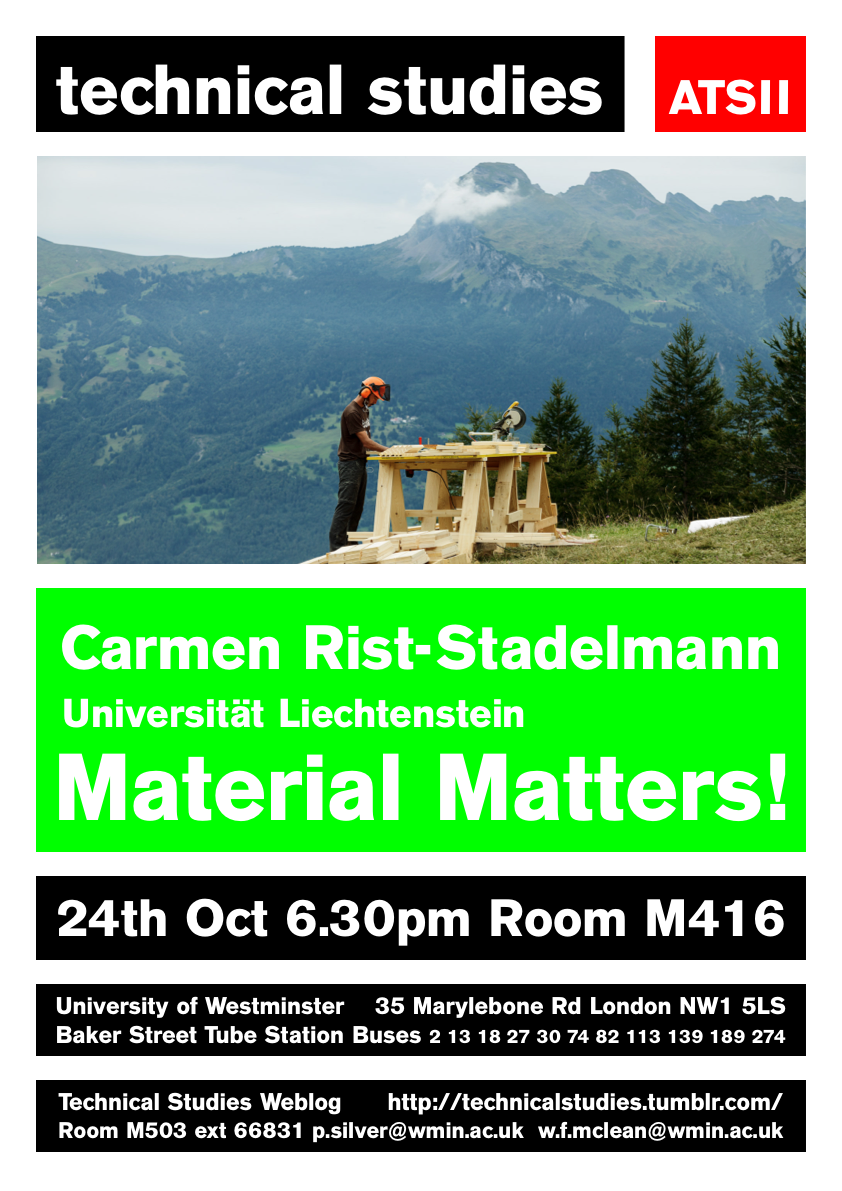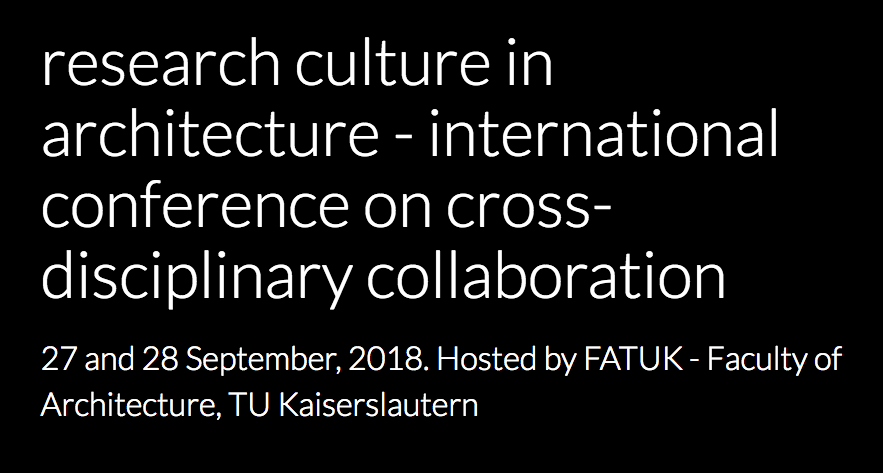Research Culture in Architecture – International Conference on Cross-Disciplinary Collaboration in Architecture
Where: Fachbereich Architektur der TU Kaiserslautern (fatuk), Germany
When: September 27 – 28, 2018
Deadline: Jun 1, 2018
During the Gothic period, Leonardo Fibonacci of Pisa (1180-1240) established the foundations of theoretical geometry. Back then, the masters of building were architects, artists and engineers at the same time. Geometry strongly influenced their artistic work. Unfortunately, little is passed down about their knowledge, because the architects did not write.
The Gothic period stands figuratively for the complexity of architecture and its research culture. Architecture refers to many participating disciplines such as construction, materials sciences, building physics, sociology, fabrication technology, computer science, geometry, arts, architectural history and theory. It is significant, that these disciplines are interlinked in planning, design and realization processes of architecture. Compared to other sciences this is certainly one of the reasons why the development of a research culture in architecture is more difficult.
The international conference aims to discuss topics and methods in architectural research, focusing on their cross-disciplinary interrelations and their relevance to the design process itself. We are interested to see approaches to the development of a research culture in architecture. This conference will identify research topics and methods, encourages a research discourse and provides impulses especially for young researchers.
The cross-disciplinary interrelations will be debated through invited keynote lectures, as well as presentations of papers and posters, which have been accepted by our scientific committee. The invited experts from academia and practice will showcase pioneering projects and developments from various fields of architectural research. Additionally, the topics will be discussed at round tables.
Keynote speakers:
Sigrid Brell-Cokcan, RWTH Aachen, Germany / Margitta Buchert, LUH Hannover, Germany / Christian Derix, Woods Bagot SuperSpace, Sydney, Australia / Michael Hensel, The Oslo School of Architecture and Design (AHO) Oslo, Norway / Caitlin Müller, MIT Cambridge, USA / Eike Roswag-Klinge, TU Berlin, Germany
Call for abstracts:
In addition to the keynote lectures, we invite students, doctoral students, academics, researchers, professors and practising architects to participate in this conference. In this call for papers we invite you to submit abstracts for papers, presentations and posters.
Topics include, but are not limited to:
Construction, material and practice:
Support structures, facade concepts, timber-constructions, timber-concrete-composite construction, concrete structures, sustainable building, space concepts, modular building, building components and connections, 3D modelling, architectural geometry, digital fabrication,…
Architectural theory and design methods:
Perception and design, spatial concepts, performance-oriented design, neuro-architecture, history and design, reflection of methods, representation as design method, representation and simulation, algorithmic and generative processes, parametric design concepts…
In the spirit of our conference theme, we suggest that you discuss your investigations within the wider context of architectural research.
Questions could be:
- Are the interrelations between material and form in architecture changing?
- How can sustainability bring disciplines together?
- How is the role of geometry changing in the architectural design processes?
- How is human perception considered in your research?
- Which kind of representations can help to visualize the design methods in architecture?
- How did historical research affect architecture at its time?
- How can architectural history have an impact on architectural design today?
- How does the filter bubble affect research & practice?
- How does practice benefit from architectural research?
- What can new theories of embodiment and neuroscience bring to architectural design?
- Does your technological research consider society issues?
- How does your research address human challenges such as migration, demographic changes and climate change?
- Is the role of technology in architecture changing?
- How do we evaluate the performance of architecture?
- What is the impact of machine learning and artificial intelligence on architecture?
The scientific committee will evaluate submitted abstracts based on the originality of the topic, the clarity of the used research methods and the presentation, under consideration of the diverse research aspects.
Abstracts will be accepted either for presentation in the form of a 15-minute talk, or a poster on display for the duration of the conference. All accepted abstracts (talks and posters) will be distributed in a booklet during the conference. A limited number of the accepted abstracts will be invited to develop their work into full research papers for publication in a book after the conference.
What to submit?
Abstract:
- extended abstract for blind reviews in English: between 600 and 1000 words
- max. 2 images with captions, 3-5 references
- the abstract should follow the structure: title, introduction, research, conclusion, references, keywords
The abstract should be supplied as pdf or word document.
Where to submit?
On https://easychair.org/conferences/?conf=rca2018 or mail to: rca2018@architektur.uni-kl.de
Dates:
1st June: Deadline for submission of abstracts
18th June: Notification of acceptance abstracts
15th July: Submission of the revised abstracts
Until 22th July: Early registration with reduced fee
From 23th July – 01st Sept.: Registration with regular fee
27th – 28th Sept.: Conference 2019: Publication of selected papers
Fees:
Early registration Participants: 150 euro
Full time students: 75 euro
Registration Participants: 180 euro
Full time students: 90 euro
If you want to register as a student, it is required that you send a proof of enrolment to: rca2018@architektur.uni-kl.de
Conference chair and organisation:
Maria da Piedade Ferreira, Cornelie Leopold, Christopher Robeller, Peter Spitzley and Ulrike Weber
The conference is hosted by fatuk, Faculty of Architecture, TU Kaiserslautern, Germany.
Scientific committee:
Dirk Bayer, TU Kaiserslautern, Germany / Jose Nuno Beirao, FAU Lisbon, Portugal / Jaume Blancafort, ETSAE, Cartagena, Spain / Stephanie Brandt, Stephanie Brandt Studio, Germany / Johannes Braumann, UFG Linz, Austria / Chris Dähne, TU Darmstadt, Germany / Elizabeth Darling, Oxford Brooks, UK / Benjamin Dillenburger, ETH Zürich, Switzerland / Eva Friedrich, Google San Francisco, USA / Jürgen Graf, TU Kaiserslautern, Germany / Uta Graff, TU München, Germany / Hans Hagen, TU Kaiserslautern, Germany / Catharina Hagg, TU Berlin, Germany / Susanne Hauser, UdK Berlin, Germany / Goncalo Castro Henriques, Unifederal, Rio de Janeiro, Brasil / Andreas Hild, TU München, Germany / Stefan Krötsch, Hochschule Konstanz, Germany / Christoph Langenhan, TU München, Germany / Katharina Lindenberg, Berner Fachhochschule, Switzerland / Alexandra Paio, ISCTE, Lisbon, Portugal / Itai Palti, Bartlett, UCL, UK / Norbert Palz, UdK Berlin, Germany / Marco Pogacnik, IUAV Venezia, Italy / Martin Ruskowski, TU Kaiserslautern / DFKI, Germany / Christoph Schindler, Hochschule Luzern, Switzerland / Gerhard Schubert, TU München, Germany / Tobias Schwinn, Uni Stuttgart, Germany / Maycon Sedrez, TU Braunschweig, Germany / José Pedro Sousa, FAUP Porto, Portugal / A. Benjamin Spaeth, Cardiff, UK / Milena Stavric, TU Graz, Austria / Defne Sunguroglu Hensel, TU München, Germany / Ioanna Symeonidou, AUTH, Greece / Angèle Tersluisen, TU Kaiserslautern, Germany / Georg Vrachliotis, KIT Karlsruhe, Germany / Xiaohong Wang, CAFA Bejing, China / Andreas Winkels, TH Bingen, Germany / Tadeja Zupancic, UL-FA, Slovenja
Reference / Quellennachweis:
CFP: Research Culture in Architecture (Kaiserslautern, 27-28 Sep 18). In: ArtHist.net, May 18, 2018. <https://arthist.net/archive/18136>.











